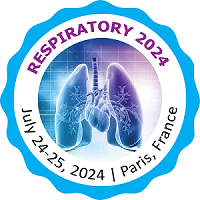Interstitial Lung Disease
Interstitial Lung Disease (ILD), or Diffuse Parenchymal Lung Disease (DPLD), encompasses a group of lung conditions affecting the interstitial tissue surrounding the alveoli. It involves various components such as alveolar epithelium, pulmonary capillary endothelium, basement membrane, and perivascular and perilymphatic tissues. ILD may develop when lung damage triggers an abnormal healing response, resulting in scarred and thickened tissue around the alveoli, making it difficult for oxygen to enter the bloodstream. Causes include exposure to hazardous chemicals, certain medications, and medical treatments, though often the exact reasons are unknown. Lung damage in ILD is typically irreversible and progressive, worsening over time. Treatment may involve medications to slow progression or, in severe cases, lung transplantation. Idiopathic Pulmonary Fibrosis is a type of ILD with no identifiable cause, often associated with characteristic radiographic and pathological findings.
- What are the causes of interstitial lung disorder?
- Diagnosis for Interstitial lung disorder
- What are the treatments for interstitial lung disorder?
- Risk factors for interstitial lung disorder
- Complications for Interstitial lung disorder
Related Conference of Interstitial Lung Disease
15th International Conference on Pulmonary & Respiratory Medicine
4th International Conference on Tuberculosis, Lung Health and Respiratory Diseases
Interstitial Lung Disease Conference Speakers
Recommended Sessions
- Advancements in Pulmonary Diagnostics
- Cardio Pulmonary Disorders
- Chronic Obstructive Pulmonary Disease
- COVID-19 and Asthma
- COVID-19 and Respiratory System
- Idiopathic Pulmonary Fibrosis
- Interstitial Lung Disease
- Lung Cancer
- Lung Transplantation
- Obstructive Sleep Apnea
- Occupational Lung Diseases
- Pneumonia
- Pulmonary diseases: Treatment, Diagnosis and therapies
- Pulmonary Hypertension
- Pulmonary Rehabilitation
- Tuberculosis
Related Journals
Are you interested in
- Advancements in Pulmonary Diagnostics - Respiratory 2024 (France)
- Asthma - Tuberculosis-2024 (France)
- Atelectasis and Pneumothorax - Tuberculosis-2024 (France)
- Cardio Pulmonary Disorders - Respiratory 2024 (France)
- Cardiopulmonary Disease - Tuberculosis-2024 (France)
- Chronic Obstructive Pulmonary Disease - Respiratory 2024 (France)
- Chronic Obstructive Pulmonary Disease (COPD) - Tuberculosis-2024 (France)
- Climate Change and Respiratory Diseases - Tuberculosis-2024 (France)
- COVID-19 and Asthma - Respiratory 2024 (France)
- COVID-19 and Respiratory System - Respiratory 2024 (France)
- Epidemiology of TB Disease - Tuberculosis-2024 (France)
- Gastroesophageal reflux disease (GERD) - Tuberculosis-2024 (France)
- Idiopathic Pulmonary Fibrosis - Respiratory 2024 (France)
- Interstitial Lung Disease - Respiratory 2024 (France)
- Latent TB Infection and Active TB Disease - Tuberculosis-2024 (France)
- Lung Cancer - Respiratory 2024 (France)
- Lung Cancer: Screening, Diagnosis & Treatment - Tuberculosis-2024 (France)
- Lung Function in Men with and without HIV - Tuberculosis-2024 (France)
- Lung Infection - Tuberculosis-2024 (France)
- Lung Transplantation - Respiratory 2024 (France)
- Multidrug-resistant TB - Tuberculosis-2024 (France)
- Mycobacterial Infections - Tuberculosis-2024 (France)
- Obstructive Sleep Apnea - Respiratory 2024 (France)
- Occupational Lung Diseases - Respiratory 2024 (France)
- Palliative Care for Advanced Lung Cancer - Tuberculosis-2024 (France)
- Pneumonia - Respiratory 2024 (France)
- Pulmonary Complications of Endocrine Diseases - Tuberculosis-2024 (France)
- Pulmonary Diseases and Therapeutics - Tuberculosis-2024 (France)
- Pulmonary diseases: Treatment, Diagnosis and therapies - Respiratory 2024 (France)
- Pulmonary Edema - Tuberculosis-2024 (France)
- Pulmonary Hypertension - Respiratory 2024 (France)
- Pulmonary Rehabilitation - Respiratory 2024 (France)
- TB Clinical Trials - Tuberculosis-2024 (France)
- TB Diagnosis, Prevention & Treatment - Tuberculosis-2024 (France)
- TB Vaccines - Tuberculosis-2024 (France)
- TB-HIV Co-infections - Tuberculosis-2024 (France)
- Tuberculosis - Respiratory 2024 (France)
- Zoonotic TB - Tuberculosis-2024 (France)

